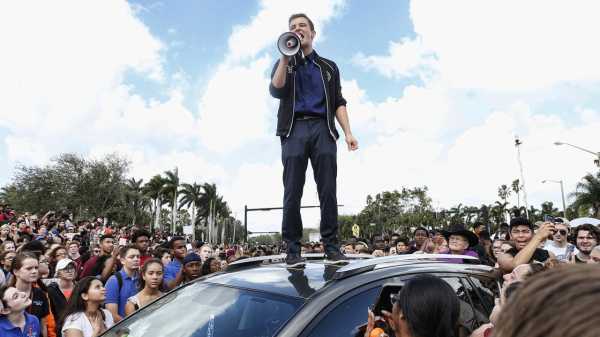
One of the less inspiring things about the movement led by student
survivors of the Marjory Stoneman Douglas High School shooting has been
the conspiracy theory—proliferated in the swampy depths where such
things proliferate—that the students are actually “crisis actors.” It’s
a warped brand of trutherism that spread after Sandy Hook and has since,
as my colleague Eric Lach wrote this week, been
impossible to reason with. But that isn’t to say that the kids aren’t
actors. Cameron Kasky, the seventeen-year-old firebrand who started the
Never Again movement with his classmates, told Wolf Blitzer, “Well, if
you had seen me in our school’s production of ‘Fiddler on the Roof,’ you
would know that nobody would pay me to act for anything.”
Taken aback, Blitzer responded, “ ‘Fiddler on the Roof’ is a great—who
did you play, by the way?” (My question, too.) The answer was Motel the
Tailor, and Kasky, staying remarkably on message, told him, “And I have
to tell you, what we’ve seen so far is a ‘Miracle of Miracles.’ ”
For former high-school-theatre kids, it’s a point of pride to see one of
our own elevated to civic hero. “All these kids are drama kids, and I’m
a dramatic kid, so it really meshes well,” Emma
González,
one of Kasky’s compatriots, told Emily
Witt.
(Kasky had just left drama class when the shooting began.) On Thursday,
the morning after Kasky asked Senator Marco Rubio if he would promise
not to take any more donations from the N.R.A. (he wouldn’t),
Kasky tweeted,
“Using my in flight chat to learn my Spring Awakening lines.” He was
referring to the Tony Award-winning rock musical from 2006, by Duncan
Sheik and Steven Sater. From the lines he posted (“can we at least
consider the fitness of the conjecture?”), it seems he’s playing the
lead, Melchior Gabor.
Further Reading
New Yorker writers respond to the Parkland school shooting.
“Spring Awakening” had already been on my mind as I watched Kasky,
González, and their classmates show more moral clarity and vision than
we’ve seen in the gun debate for a long time. Based on the 1891 play by
the German dramatist Frank Wedekind, the musical shows what happens when
neglectful adults fail to make the world safe or comprehensible for
teen-agers, and the onus that neglect puts on kids to beat their own
path forward. The unregulated weapon, in the show, isn’t guns but sex.
Melchior and his classmates are burning up with hormones, but in a
repressive society that insists on ignorance over truth, sex is never
explained. It’s up to the kids to figure it out—badly. At the end of Act
I, Melchior and the object of his affection, Wendla, have sex, and when
Wendla becomes pregnant she has no idea why. “Why didn’t you tell me
everything?” she screams at her mother, who shuffles her off to a
botched abortion.
In the musical’s final scene, Melchior visits the grave of his friend
Moritz, who killed himself under the weight of school exams and his
father’s expectations. “Moritz, my old friend,” he says, kneeling on the
grave. “Well, they won’t get to me. Or Wendla. I won’t—I won’t let them.
We’ll build that world, together, for our child.” He looks around at
“all these little tombs,” before discovering, to his horror, a fresh one
for Wendla. Attended by their ghosts, he sings
I’ll walk now with them,
I’ll call on their names.
And I’ll see their thoughts are known.
Not gone.
Not gone.
It’s hard to imagine watching “Spring Awakening” in Broward County, a
community where the living are indeed walking on for the dead. Like
Melchior, Kasky and his classmates have vowed to remake a world that
failed them—a role that no teen-ager should have to play, especially in
the wake of tragedy and trauma. We don’t find out what happens to
Melchior in the next scene, but I’d like to think that he goes back to
school and gives his Latin teacher the same look that Kasky gave Rubio
on Wednesday night—one that says that the world no longer belongs to the
grownups, because the kids have seen through the B.S. and know that their
lives are on the line. (As for the kids in the town-hall audience, I
half-expected them to respond to Rubio with a lyric from the Act II
showstopper “Totally Fucked”: “Blah blah blah blah blah blah blah blah
blah blah blah blah blah.”)
As it turns out, Sater and Sheik began writing “Spring Awakening” in
response to the Columbine massacre. “I had heard that Cameron Kasky was
now playing Melchior,” Sater wrote me yesterday. “He has been so
eloquent and impassioned, alive with the force of truth—like Melchior
himself. I was just discussing that with Duncan earlier today.” (Sheik,
for his part,
tweeted,
“The Spirit of Wedekind lives on holding the feet to the fire of the
assholes in the @NRA and their cynical, small minded ilk!”)
“It was a real act of resistance, in 1891, when the angry young Frank
Wedekind first penned his ‘Frühlings Erwachen’ (‘Spring Awakening’),”
Sater said. “To this day, it remains the most scabrous indictment ever
written of adulthood. Of parents, teachers, and a clergy so invested in
their social prestige that they will sacrifice even their children to
protect it.” He went on, “Perhaps only Wedekind could have imagined,
among this ‘Columbine generation,’ a young hero, a Melchior, like Cameron Kasky, like Emma González, like Ryan
Deitsch,
capable of standing so strong, of speaking the bald truth to the
ever-collected, if contorted, face of power. I know I am profoundly
affected to hear, in their simple demands, the play’s fierce original
spirit: ‘Why did you let them? You broke it. Fix it.’ ”
Sourse: newyorker.com






